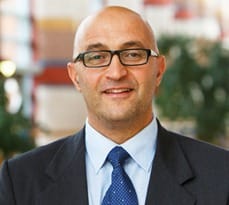Khaled Soufani, Director of the Cambridge Judge Executive MBA programme, chosen as Guest Editor for a special issue of the California Management Review on ‘the circular economy’.

The California Management Review has named Khaled Soufani, Senior Faculty in Management Practice (Finance) and Director of the Executive MBA programme at Cambridge Judge Business School, as a Guest Editor for an upcoming special issue on “the circular economy.”
The business journal published by the Haas School of Business at University of California Berkeley has issued a call for papers for the special issue, which will examine managerial and policy implications of the circular economy – which seeks to boost sustainability through the reuse of resources through recycling and transformation.
“The concept of circular economy has been gaining a great deal of attention in both business and political discussions lately,” the California Management Review said in announcing the special issue. “This is unsurprising because the current ‘linear’ growth models that both companies and countries have adopted are heavily based on using up resources.”
For example, the journal said, it is estimated that in Europe 90 per cent of raw materials used in manufacturing become waste before the product leaves the factory, while 80 per cent of products made get thrown away in the first six months of their existence.
The journal seeks articles on such topics as the best practices in “remanufacturing” and closed-loop recycling, disruptive technology that can advance the circular economy, dealing with stakeholders who lose out in the circular economy, and organisational design in adopting the circular model. Initial draft papers are due by mid-February 2016.
“It is important to note that the circular economy is not about corporate social responsibility or green strategies although they are part of the discussions,” the journal said. “The circular model requires firms to come up with disruptive technology and business models that are based on longevity, renewability, reuse, repair, upgrade, refurbishment, servitisation, capacity sharing and
dematerialisation. This means that they have to step away from just cost-cutting but instead start focusing on rethinking products and services as well as customer propositions.”
Along with Soufani, the other guest editors for the special issue are Terence Tse, Associate Professor at ESCP Europe, who earned his PhD at Cambridge Judge, and Mark Esposito, a Senior Associate at the Cambridge Institute of Sustainability Leadership and a Professor at Grenoble School of Management in France and Harvard University Extension School. The three men have conducted research together into such topics as “Fast-Expanding Markets” (FEMs), the topic of a recent article in Thunderbird International Business Review.


